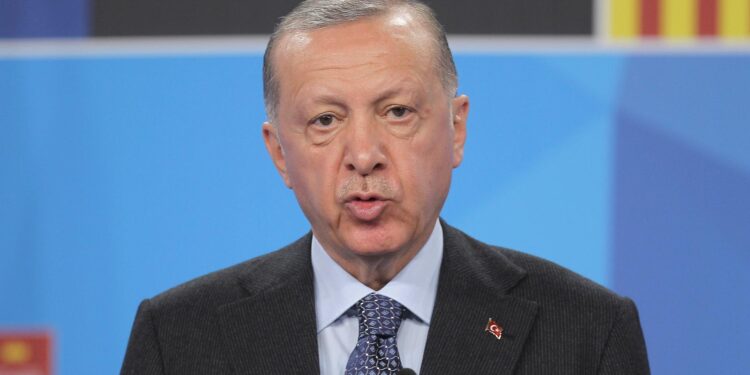Turkey’s Proposal for a Two-State Solution: A Shift in Cyprus’ Geopolitical Landscape
In a significant progress regarding the long-standing conflict in Cyprus, Turkish President Recep Tayyip Erdogan has reiterated his endorsement of a two-state solution for the island. During recent diplomatic engagements, Erdogan highlighted Turkey’s commitment to addressing the territorial and political division of Cyprus—a divisive issue that has lingered for many years.This renewed stance not only underscores Turkey’s strategic interests in the Eastern Mediterranean but also complicates ongoing peace initiatives, challenging the internationally recognized framework that supports a unified Cyprus. As various parties reflect on this critical declaration, it is vital to assess its potential impacts on both Turkish and Greek Cypriots as well as broader regional geopolitics.
Erdogan’s Two-State Solution and Its Geopolitical Impact
The Turkish President’s reaffirmation of support for a two-state resolution marks an essential shift in regional political dynamics, prompting stakeholders to reevaluate diplomatic relations and strategic alliances. This position advocates formal recognition of the Turkish Republic of Northern Cyprus (TRNC), which has been acknowledged solely by Turkey since its unilateral independence declaration in 1983.Such recognition could bolster Turkey’s influence over Eastern Mediterranean affairs while perhaps escalating tensions with Greece and the Republic of Cyprus. The implications are multifaceted and include:
- Increased Military Presence: A solidified two-state stance may result in an expansion of Turkey’s military footprint within the region.
- Shifts in EU Relations: The European Union may face challenges regarding its approach to Cyprus’s status, complicating Turkey’s aspirations for EU membership.
- Diplomatic Realignments: Neighboring countries might reassess their diplomatic strategies, leading either to renewed partnerships or heightened rivalries.
The geopolitical landscape is further elaborate by global powers such as the United States and Russia who are invested in maintaining stability within this area. Erdogan’s insistence on pursuing a two-state framework not only undermines years of UN-led peace negotiations but also creates an environment fraught with tension that could escalate into military confrontations. To better understand these competing narratives and power dynamics, consider this comparative overview:
| Cypriot Entities | Status Recognition | Main Supporters |
|---|---|---|
| Republic of Cyprus | A globally recognized entity | E.U., USA |
| Turkish Republic of Northern Cyprus | Recognized exclusively by Turkey | Turkey |
Global Reactions to Turkey’s Position on Cyprus
President Erdogan’s recent affirmation supporting a two-state solution has sparked diverse reactions worldwide.
Numerous officials from Europe and America have voiced their concerns about this position,
emphasizing how crucial unity is for lasting geopolitical stability in this region.Critics argue that Ankara’s stance could further obstruct peace efforts while intensifying existing tensions across eastern Mediterranean waters.
The consensus among various stakeholders highlights diplomacy over division; nations like Greece and Cypriot authorities have reiterated their commitment towards establishing
bi-zonal,
bi-communal federations as viable negotiation frameworks.
As these developments unfold,
responses from key international players illustrate just how intricate
issues surrounding
Cypress can be.
The European Union has notably expressed disappointment regarding unilateral actions taken by Ankara,
while U.S officials advocate returning to dialog emphasizing cooperation among Cypriots.
These reactions can be summarized succinctly:
- E.U.’s Critique: Concern about undermining UN-led peace processes.
- U.S Position: Advocates collaborative approaches toward resolving territorial disputes.
- Greece’s Stance: Reinforces necessity for unified governance over Cypress.
- Cypriot Response: Ongoing advocacy seeking international backing against division.
<
>As geopolitical circumstances evolve,
implications stemming from statements made by Turkeys leadership will likely reverberate through diplomatic channels keeping Cypress firmly positioned on global agendas.
Tensions related energy exploration activities occurring throughout eastern Mediterranean regions may additionally influence international responses thereby complicating alliances even further;
understanding broader ramifications becomes vital when considering future relations between Turks & Cypriots along with overall regional stability.<
> Diplomatic Strategies For Peacebuilding In Eastern Mediterranean Regions
<
>Given recent events unfolding around Cypress territory it remains imperative stakeholders adopt multifaceted approaches prioritizing collaboration & comprehension amongst involved parties;
fostering dialogues between both communities (Turkish-Cypriots & Greek-Cypriots) serves bridging longstanding divides effectively!
Key initiatives should focus upon:<
- >
- :: Inclusive Negotiation Frameworks::: Encouraging clear discussions accommodating interests across all communities involved!
Implementing confidence-building measures promoting mutual trust through joint cultural/social programs!<Implementing confidence-building measures promoting mutual trust through joint cultural/social programs!
Leveraging external actors’ influence facilitating constructive negotiation processes!
<>
<>
<>
<:: Area Of Cooperation: Potential Impact:< >
tr >>
tr >>
Energy Collaboration
>Shared resources leading greater regional stability/economic benefits! >
Cross-Border Trade Initiatives>Facilitated trade bolstering economic ties creating mutual dependencies! >
Tourism Development>Joint tourism projects fostering peaceful coexistence boosting local economies! >
Concluding Thoughts on Future Prospects Regarding Cypress Conflict Resolution Strategies
To summarize our discussion surrounding President Recep Tayyip ErdoÄźan reaffirming his support towards advocating solutions based upon recognizing separate states within Cypus territory highlights ongoing complexities tied up with island divisions alongside long-standing geopolitical tensions present throughout entire regions.
As talks continue progressing forward involving multiple stakeholders weighing options available—Erdogan signaling steadfast commitments aligning aspirations held dearer than ever before—pathways remain uncertain yet emphasize importance placed upon continued dialogue/negotiation necessary resolving one Europe most enduring disputes!
With local/international communities observing closely quest lasting resolutions persists; repercussions stemming decisions made today likely resonate far into future generations ahead!
ADVERTISEMENT
< - :: Inclusive Negotiation Frameworks::: Encouraging clear discussions accommodating interests across all communities involved!
















